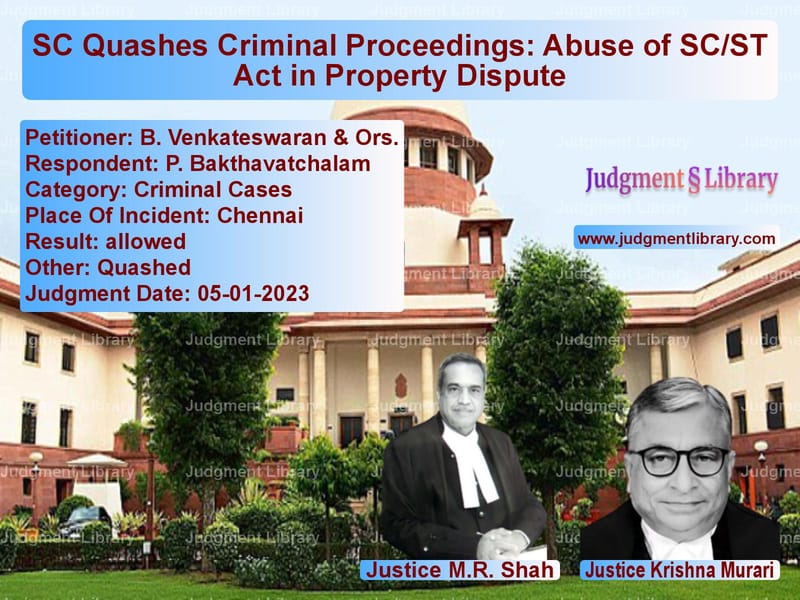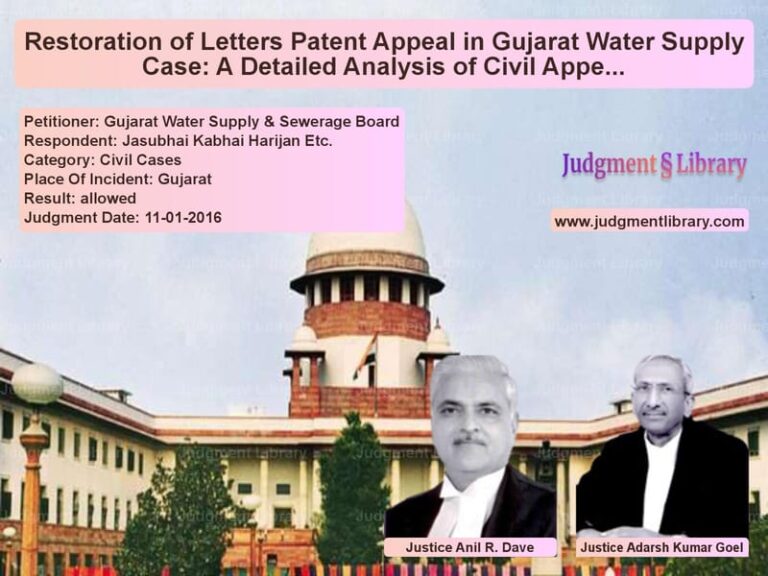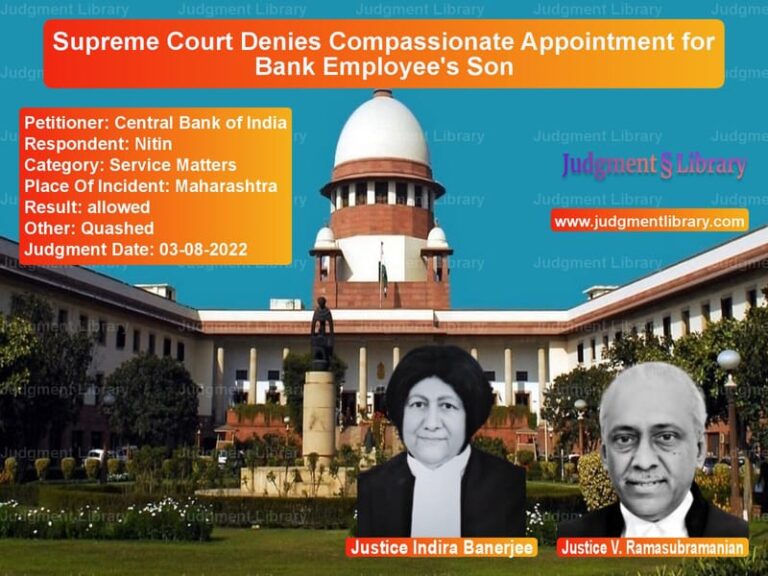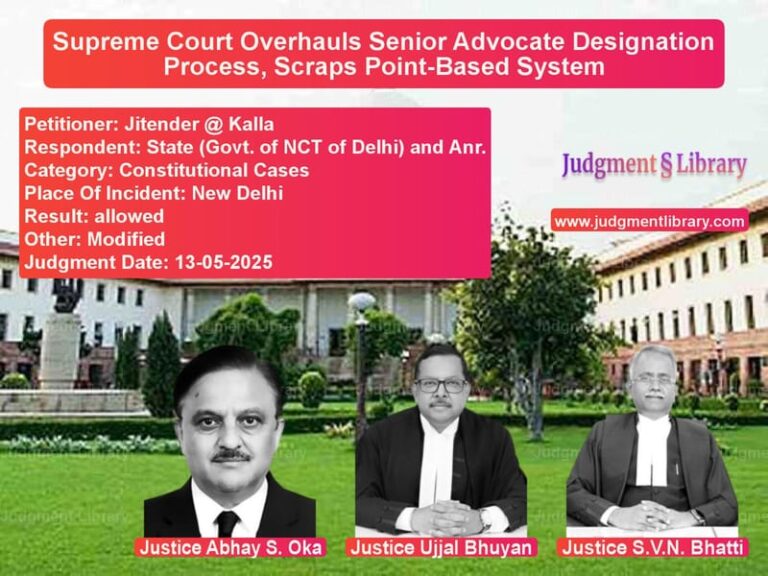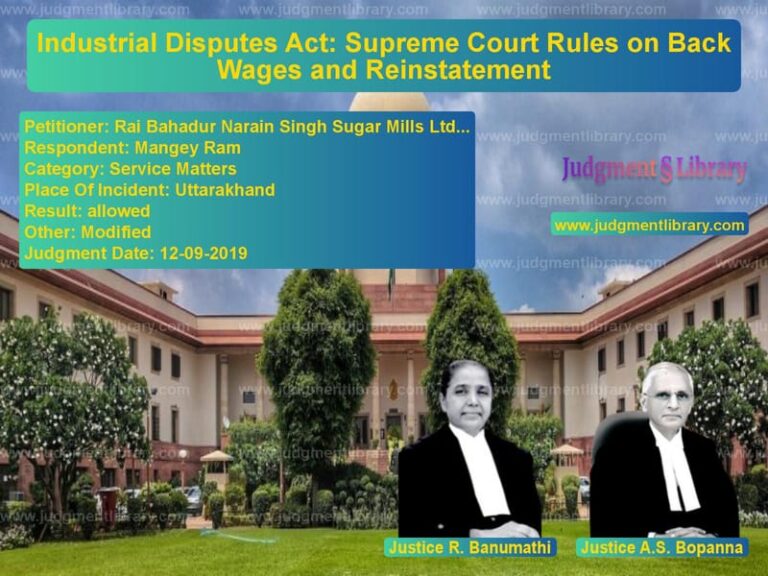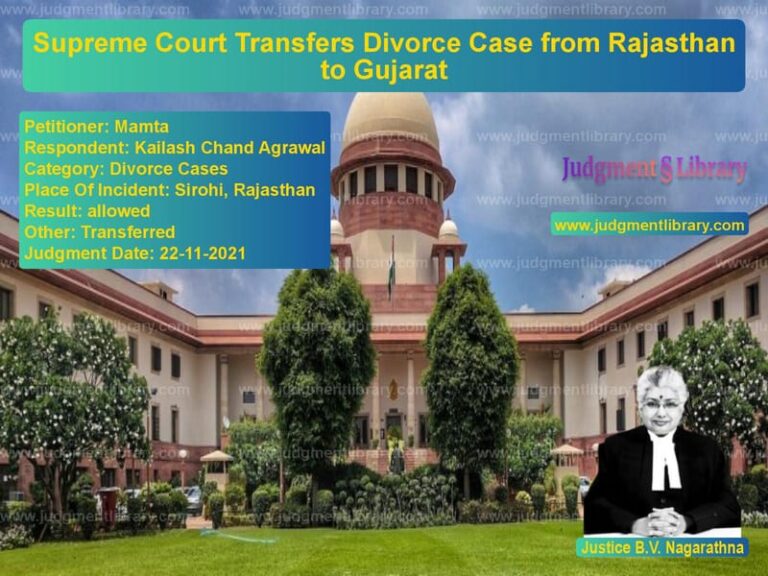SC Quashes Criminal Proceedings: Abuse of SC/ST Act in Property Dispute
The case of B. Venkateswaran & Ors. v. P. Bakthavatchalam presented a significant legal battle where the accused sought to quash criminal proceedings initiated under the Scheduled Castes and the Scheduled Tribes (Prevention of Atrocities) Act, 1989. The dispute centered around a property-related issue that escalated into criminal charges under the SC/ST Act, raising questions about the misuse of special legal provisions in civil disputes.
The appellants had challenged the High Court’s order, which refused to quash the criminal proceedings filed against them. The Supreme Court examined whether the allegations constituted an offense under the SC/ST Act and whether the High Court erred in refusing to quash the complaint. After reviewing the evidence and legal provisions, the Supreme Court ruled that the case was an abuse of process of law and quashed the proceedings.
Background of the Case
The dispute originated when the complainant, P. Bakthavatchalam, filed a private complaint under Section 200 of the Code of Criminal Procedure in the Metropolitan Magistrate Court, Egmore, Chennai. The complaint alleged that the appellants had encroached upon a pathway adjacent to the complainant’s house and constructed a temple, causing obstruction to his water pipeline, sewage pipeline, and electricity cable.
The complainant claimed that despite a High Court order to stop the construction, the appellants continued their activities, preventing him from constructing his building and allegedly intimidating him. The Special Court, upon recording statements under Sections 200 and 202 of the CrPC, took cognizance of the case under Sections 3(1)(v) and 3(1)(va) of the SC/ST Act and issued summons to the accused.
Legal Issues and Arguments
Appellants’ Arguments
- The appellants, represented by Shri Nagamuthu, contended that the criminal case was a misuse of the SC/ST Act in a private property dispute.
- They argued that there were no allegations in the complaint that they acted with the knowledge that the complainant belonged to the SC/ST community.
- The accused maintained that the temple had been in existence for many years, and the dispute was civil in nature, which the complainant was attempting to turn into a criminal case.
- The complainant himself had violated building norms and had unauthorized constructions, which were being challenged before the authorities.
Respondent’s Arguments
- The complainant argued that the appellants had deliberately constructed a temple on a common pathway, obstructing his property rights.
- He alleged that the accused persons prevented him from using his own land, thus committing atrocities under the SC/ST Act.
- The complainant contended that the High Court had earlier passed orders recognizing his grievances, but the appellants continued their illegal activities.
Findings of the Supreme Court
The Supreme Court carefully examined the allegations in the complaint and the material on record. The key observations of the court included:
- The complaint lacked specific allegations that the appellants had targeted the complainant because of his SC/ST status.
- The dispute between the parties was primarily a civil property dispute, which was being converted into a criminal case.
- There was no prima facie case under Sections 3(1)(v) and (va) of the SC/ST Act as the elements of the offense were not satisfied.
- Prior litigation history revealed that the complainant had already approached the Madras High Court on similar issues, and the High Court had not found any illegal encroachment by the temple.
- Considering the facts, the Supreme Court held that invoking the SC/ST Act in such cases amounted to abuse of the legal provisions.
Final Judgment
The Supreme Court ruled in favor of the appellants and quashed the criminal proceedings. The key ruling was as follows:
“Having considered the allegations in the complaint and the material on record, it appears that initiation of the criminal proceedings by the respondent against the appellants under the provisions of the Scheduled Castes and the Scheduled Tribes (Prevention of Atrocities) Act, 1989 is nothing but an abuse of process of law.”
The court emphasized that the SC/ST Act was enacted to protect marginalized communities from genuine atrocities and not to be misused in private disputes. It stated:
“We are of the firm opinion and view that in the facts and circumstances of the case, the High Court ought to have quashed the criminal proceedings in exercise of powers under Section 482 of the Code of Criminal Procedure.”
The court, therefore, quashed the High Court’s judgment and set aside the criminal proceedings against the appellants.
Significance of the Judgment
The Supreme Court’s ruling in this case highlights the importance of preventing the misuse of protective legal provisions such as the SC/ST Act. Some key takeaways include:
- Ensuring proper application of the SC/ST Act: Courts must scrutinize whether allegations truly fall under the purview of the Act.
- Preventing conversion of civil disputes into criminal cases: Property disputes should be resolved through civil litigation rather than invoking criminal laws inappropriately.
- Protecting against frivolous litigation: The judiciary must intervene in cases where legal provisions are misused for personal vendettas.
This case serves as an essential precedent in preventing wrongful criminalization in civil disputes and upholding the integrity of special legal protections meant for marginalized communities.
Petitioner Name: B. Venkateswaran & Ors..Respondent Name: P. Bakthavatchalam.Judgment By: Justice M.R. Shah, Justice Krishna Murari.Place Of Incident: Chennai.Judgment Date: 05-01-2023.
Don’t miss out on the full details! Download the complete judgment in PDF format below and gain valuable insights instantly!
Download Judgment: b.-venkateswaran-&-o-vs-p.-bakthavatchalam-supreme-court-of-india-judgment-dated-05-01-2023.pdf
Directly Download Judgment: Directly download this Judgment
See all petitions in SC/ST Act Case
See all petitions in Custodial Deaths and Police Misconduct
See all petitions in Legal Malpractice
See all petitions in Contempt Of Court cases
See all petitions in Judgment by Mukeshkumar Rasikbhai Shah
See all petitions in Judgment by Krishna Murari
See all petitions in allowed
See all petitions in Quashed
See all petitions in supreme court of India judgments January 2023
See all petitions in 2023 judgments
See all posts in Criminal Cases Category
See all allowed petitions in Criminal Cases Category
See all Dismissed petitions in Criminal Cases Category
See all partially allowed petitions in Criminal Cases Category

